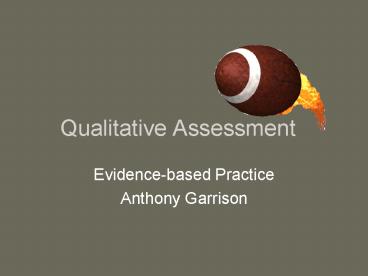Evidencebased Practice - PowerPoint PPT Presentation
1 / 16
Title:
Evidencebased Practice
Description:
5 minute discussion board entries (read and write then discuss) ... Timed lists # of items per list. Memory Matrix. France U.S. Britain. Neoclassicism. Impressionism ... – PowerPoint PPT presentation
Number of Views:40
Avg rating:3.0/5.0
Title: Evidencebased Practice
1
Qualitative Assessment
- Evidence-based Practice
- Anthony Garrison
2
(No Transcript)
3
James GeeLearning and Video Games
- 9 - Self-Knowledge Principle
- The virtual world is constructed in such a way
that learners learn not only about the domain but
about themselves and their current and potential
capacities - 9 - Translation
- The classroom learning environment should be
structured in such a way that learners not only
learn about the content but about themselves and
their current and potential learning abilities.
4
- 11 - Achievement Principle
- For learners of all levels of skill there are
intrinsic rewards from the beginning, customized
to each learners level, effort, and growing
mastery and signaling the learners ongoing
achievements. - What are the intrinsic rewards in our classes?
- How are they customized for students?
- How do students receive ongoing achievement
signals?
5
Lets Get on the Same Page
- Qualitative less rigorous than Quantitative
for us non-math people - Assessment Grades on assignments leading to a
course grade
6
AssessmentGroup Work!
- What is the role of assessment in our classrooms?
- Draw a diagram of how assessment fits into your
pedagogy - How often does assessment occur in our
classrooms? - Who benefits most from assessment
(student/teacher/university)? - Can we eliminate assessment for the sake of
learning?
7
Assessment Defined
- Peggy Macki - a systematic and systemic process
of inquiry into what and how well students learn
over the progression of their studies . . .
Driven by intellectual curiosity about the
efficacy of collective educational practices - In what ways is assessment Systematic?
- Systemic?
8
(No Transcript)
9
Hunting and Gathering
- The 80/20 rule
- 80 is gathered and 20 is hunted
- Formative assessment is gathered over time from a
variety of sources and shapes current practice - Summative assessment occurs at the conclusion of
significant chunks of semester and informs future
practice
10
80/20 An Assessment Inventory
- List the formative assessments that already occur
in your classrooms - List the summative assessments that occur in your
classrooms - Mark each item as Q (qualitative) and
(quantitative) - Q Subjective, informal/formal
- Objective, informal/formal
11
What We Can Assess
- Knowledge Skills
- Prior knowledge, recall, understanding, critical
thinking, creative thinking, problem solving,
performance, etc - Attitudes, Values Self-Awareness
- Reaction to Instruction
- Teachers, teaching, activities, assignments,
materials, etc
12
Sample Qualitative Assessments to Try
- Background Knowledge Probe
- Open ended questions
- 5 minute discussion board entries (read and write
then discuss) - Student on-the-spot summaries/guesses
13
- Focused Listing
- Timed lists
- of items per list
- Memory Matrix
- France U.S. Britain
- Neoclassicism
- Impressionism
- Expressionism
- Muddiest Point
- What was the muddiest point in__________?
14
- Analytic Memo
- 1-2pp memo to employer analyzing specific issue
- 1 Sentence Summary
- WDWWWWHW (who does what to whom, when, where,
how, and why) - Ex- Thomas Angelo argues teachers should asses
their students learning regularly during the
semester in their own classrooms using . . .
qualitative means so that they can understand
and improve teaching
15
- Invented Dialogues
- Move from conversational issue into a dialogue
(role-play) - Documented Problem Solutions
- Students try to solve a content specific problem
and document how they tried to solve it - Double-Entry Journals
- Left Principle Right Personal App
16
- Chain Notes
- Envelope/note cards/questions - Pass around
- Peer/Group/Self Evaluations
- Random reports back to teacher about learning
practices, achievements, stumbling blocks - Exam Evaluations
- Feedback elicited from students post exam on
varying issues































